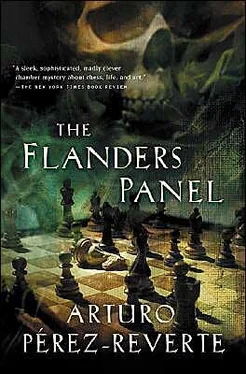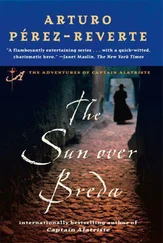“What’s going on?” she asked, shivering.
“You’ll find out soon enough.”
“What does bishop takes pawn mean?”
The fleeting lights outside slid across Munoz’s frowning face.
“It means,” he said, “that the black queen is about to take another piece.”
Julia blinked, stunned by this news. She grasped Munoz’s hand with her two frozen hands and looked at him in alarm.
“We must warn Cesar.”
“We’ve still got time,” replied Munoz.
“Where are we going?”
“To Penjamo. One j two aitches.”
It was still raining heavily when the taxi pulled up outside the chess club. Munoz opened the door without letting go of Julia’s hand.
“Come on,” he said.
She followed him meekly up the steps to the hall. There were still a few players at the tables, but Cifuentes, the director, was nowhere in sight. Munoz led her straight to the library. There, amongst trophies and diplomas, were glass-fronted shelves lined with a few hundred books. Letting go of Julia’s hand, he slid open one of the glass doors and took down a fat leatherbound volume. On the spine, in gold letters darkened by use and time, a puzzled Julia read: Chess Weekly. Fourth quarter. The year was illegible.
Munoz put the book on the table and turned the yellowing pages of cheap paper. Chess problems, analyses of games, information about tournaments, old photographs of smiling winners in white shirt, tie and suits and haircuts of the period. He stopped at a double-page spread of photographs.
“Look at them carefully,” he told Julia.
She bent over the photos. They were of poor quality and all showed groups of chess players posed for the camera. Some held cups or certificates. She read the headline: SECOND JOSE RAUL CAPABLANCA NATIONAL TROPHY.
“I don’t understand,” she murmured.
Munoz pointed at one of the photos. In the group of boys, two were holding small trophies; the other four were staring solemnly at the camera. At the bottom of the photo were the words: FINALISTS IN THE JUNIOR LEAGUE.
“Do you recognise anyone?” asked Munoz.
Julia studied the faces one by one. Only a face on the far right seemed faintly familiar. It belonged to a boy of fifteen or sixteen. His hair was brushed back and he was wearing a jacket and tie and a black armband on his left arm. He was looking at the camera with calm, intelligent eyes, in which she thought she could see a glint of defiance. Then she recognised him. When she pointed at him with her finger, her hand was shaking, and when she looked up at Munoz, he nodded.
“Yes,” he said, “that’s our invisible player.”
XIV Drawing-room Conversation
“I found it only because I was looking for it.”
“What? You mean you were expecting to find it?”
“I thought it not unlikely.”
Sir Arthur Conan Doyle
The light on the stairs wasn’t working, and they went up in the dark, Munoz first, guiding himself with his hand on the banister. When they reached the landing, they stood in silence, listening. They heard no sound inside, but there was a line of light beneath the door. Julia couldn’t see her companion’s face in the darkness, but she knew Munoz was looking at her.
“There’s no going back now,” she said in response to his unasked question. The only reply she got was Munoz’s calm breathing. She felt for the bell and pressed it once. Inside, its noise faded to a distant echo.
It was a while before they heard the slow approach of footsteps. The steps paused for a moment, then continued, moving still more slowly and getting nearer, until they stopped completely. The lock turned for what seemed an age and then at last the door opened, casting a momentarily dazzling rectangle of light on them. Julia looked at the familiar figure silhouetted against the soft light, thinking that this was one victory she did not want.
He stepped aside to let them pass, appearing unperturbed by their unexpected visit. The only outward sign was a somewhat disconcerted smile Julia glimpsed as he closed the door behind them. On the heavy walnut-and-bronze Edwardian coatstand, a raincoat, hat and umbrella were still dripping.
He led them down a long corridor with a high, exquisitely coffered ceiling and walls adorned with nineteenth-century landscape paintings from Seville. He went on ahead of them, turning round every so often with the attentiveness of a good host. In vain, Julia sought some hint of that other personality she now knew lay hidden in him, like a ghost that had always floated between them and whose presence she would never again be able to ignore. Despite the light of reason seeping into the corners of her doubts, despite the facts that fitted together now like the smooth-edged pieces of a jigsaw and projected onto the images in The Game of Chess the outlines, in light and shade, of the other tragedies that were now superimposed on the one symbolised in the Flemish painting – despite all that and her sharp awareness of the pain which, little by little, was replacing her initial stupor, Julia was incapable of hating the man walking ahead of them, half-turning with solicitous courtesy, elegant even in private, in a blue silk dressing gown over well-cut trousers, a scarf knotted in the open neck of his shirt, his hair, slightly wavy at the back of the neck and at the temples, immaculate, his eyebrows arched in the expression of indifference proper to an ageing dandy but which, in Julia’s presence, had always been softened by the sad, sweet, tender smile that hovered now at the corners of his pale, thin lips.
None of them said anything until they reached the large drawing room with its high ceiling decorated with classical scenes. Julia’s favourite, until that night, had always been the scene depicting Hector in a shining helmet bidding farewell to Andromache and her son. The room, whose walls were covered with tapestries and paintings, contained Cesar’s most prized possessions, those which he had chosen to keep for himself, no matter what price was offered for them. Julia knew them all as if they were her own: the silk-upholstered Empire sofa, on which Munoz, his face set in an expression of stony seriousness, his hands in his raincoat pockets, hesitated to sit even though Cesar urged him to do so; the bronze statuette of a fencing master signed by Steiner, its swordsman erect and handsome, his proud chin lifted, dominating the room from his pedestal on the late eighteenth-century Dutch writing desk at which, for as long as Julia could remember, Cesar had always written his letters; the Regency corner cabinet containing a beautiful collection of chased silver that he himself polished once a month; the Lord’s Anointed ones, his favourite paintings: a Young woman attributed to Lorenzo Lotto, a very beautiful Annunciation by Juan de Soreda, a sinewy Mars by Luca Giordano, a melancholy Eventide by Thomas Gainsborough; the collection of English porcelain; the carpets, tapestries and fans. These were pieces whose individual histories Cesar had carefully compiled, collating every last fact about style, provenance and genealogy, to form a private collection so personal, so closely bound by his own aesthetic taste and character that he seemed to be part of the essence of each and every one.
Munoz had remained standing, affecting a calm, silent exterior, although something about him, perhaps the way his feet were positioned on the edge of the carpet or the way his elbows stuck out above the hands thrust into his pockets, indicated that he was on the alert, ready to confront the unexpected. For his part, Cesar was looking at him with dispassionate, courteous interest, only now and then turning to look at Julia, as if, because she was at home there, it was up to Munoz, the only stranger in the house, to explain his reasons for turning up so late at night. Julia, who knew Cesar as well as she knew herself- she made an instant mental correction: whom until that night she had thought she knew as well as herself- had seen, the moment Cesar opened the door, that he understood their visit implied something more than just a call on their third comrade in the adventure. Beneath his attitude of friendly forbearance, she recognised, in the way he smiled and in the innocent expression in his clear blue eyes, cautious expectation and a touch of amusement. It was the same look with which, when he’d held her on his knees, he would wait for her to say the magic words, the answers to the childish riddles she loved him to set her: It looks like gold, it is not silver… Or: What is it that goes on four legs in the morning, two legs at noon and three legs in the evening?… And, the best of all: The distinguished lover knows the name of the lady and the colour of her dress…
Читать дальше












